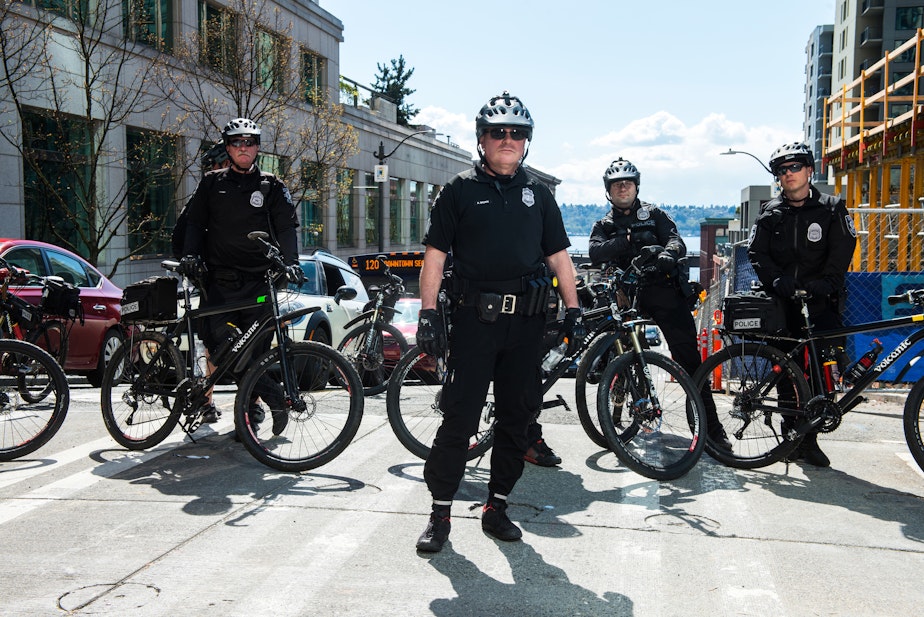LISTEN: Three candidates vie for Seattle Police Chief

Seattle is down to the final three contenders for Seattle Police chief. Mayor Jenny Durkan has said she will announce the appointee this month.
We sat down with each candidate to get their thoughts on the race and what they would do in the job. Below are highlights from their interviews which you can listen to in full:
On being back in the running
“I'm actually just so excited to be back in the running for the permanent police chief's job. It is what I have been training to do, wanting to do, for my entire career now. And I feel very gratified to be back in the running. And I'm just going to work really hard to make it permanent.”
On her 26 years in the department, and reassuring officers and the mayor she’s willing to make reforms
“Look, I'm not new to this. [Former Seattle Police Chief Kathleen] O’Toole, who is a recognized international reform leader, handpicked me to run the day-to-day operations of the Seattle Police Department four and a half years ago to make sure that we reached our reform goals and efforts.
And we were essentially full and effective compliance. Now we’re at the stage where we need to work really hard to make sure that all of those reforms are embedded in the culture of the organization, that the culture is continuously improving and innovating and moving forward.”
On officer morale
“While there may be some frustration about not having a contract — and rightfully so — there's a frustration about the staffing issues that we're going through — and rightfully so — these cops are out here every day giving 110 percent. And for that you know, I'm grateful. I would say that they're out doing the work and they're not leaving in droves. They're here getting it done.”
On his background
“I consider myself a leader. First and foremost my integrity and honor is something that's been drilled into me, not only from my military service as an officer, but by my parents. They instilled a work ethic in me that is unbending. Do the right things for the right reason. And what rings in my head once an hour every day is that all you have is your word. So when you say you're going to do something, then do it.”
On his lawsuit against a Minneapolis Police Chief (read the backstory here)
“I fought for a right to get a veteran's preference hearing that I felt I was deserved of after at least 30 years in the military. And I can say with absolute confidence -- I currently hold a top security clearance, that's something that's reviewed every five years. I've been vetted by the FBI National Academy. I've been vetted through the United States Army War College. And at the end of the day I'm the last one standing of that entire situation.”
On strategies for reducing the number of officer-involved fatalities
“It goes back to training. It goes back to individuals understanding exactly the parameters in which they're supposed to operate in those types of situations. And through that training, they develop muscle memory, which enables them to react to those very, very tragic instances where there's a loss of life. But first and foremost, officers have to have it instilled in them that preservation for life.”
On comparing Austin to Seattle
“I think that a lot of the challenges that we have in Austin are similar to the ones that are being faced here in Seattle. And that's one of the things that piqued my interest when the posting came open is that: the affordability issues, the homelessness, the gentrification, a lot of those same issues that Seattle is facing now we're facing in Austin.”
On the DOJ’s investigation into the Austin Police Department for allegations of racially tinged excessive force
“Luckily we did not come under a consent decree. But during that time, the DOJ did make 165 recommendations for the police department and we implemented those recommendations.
And a lot of that was under the leadership of [Austin Chief of Police] Art Acevedo — changing the culture of the department, to understand the importance of building trust in the community, being out in the community, building those relationships and then changing our policies to reflect what the DOJ was telling us what best practices were. And then ensuring that not only do we have the policies in place, but they were actually being practiced on the street as well.”
On Mayor Durkan’s impending decision
“I think that each of the candidates has something different to offer. And at the end of the day the mayor has to make her choice based on who she believes can put the Seattle Police Department in a position to 1) where they're going to maintain compliance with the consent decree for the next 18 months, to be able to get out from under that consent decree, and 2) to also continue on those reforms and foster a change of culture within the organization so that those changes are actually embedded and moving forward, it just becomes common practice.

